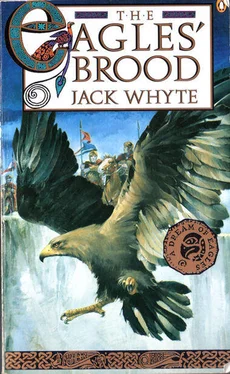Orvic had been right about the cross-river traffic upstream from Londinium. Less than a day's march upriver from the town—a progress greatly hampered by our wagons and the lack of a road—we arrived, unsighted and unchallenged, at a regular crossing point. A deeply rutted track led us alongside the great river to where the thick growth of willows and scrub lining the bank had been cleared to accommodate a primitive ferry. This device, no more than a large, floating platform, was anchored and operated by a system of ropes and pulleys, all firmly fastened to two massive oak trees, one on each side of the river. When we arrived, the ferry lay on the opposite side from us, untended, and it had obviously been there for some time, for the river had receded in the hot weather and the craft lay high and dry on the mud of the riverbank. We couldn't move it at all, from where we were, although we put as many men on the pulley ropes as we could. The river itself was wide and muddy at the crossing, flowing slowly and placidly with no visible eddies and no indication of strong currents. One of our younger squadron leaders, claiming the ability to swim like a fish, volunteered to swim across and test the current and the depth of the stream. He came to his feet in midstream, with his head clear of the water, and called to us that there was no current to speak of.
A dozen men and horses followed him to prise the ferry free of its muddy berth, and in less than two hours, our entire force had crossed over safely and easily, the wagons on the ferry and the troopers on horseback. We camped that night close by the riverbank, screened from the other side by the fringe of thick willows.
The following day, we set out eastward again, following the track leading from the ferry. The track soon petered out, however, completely overgrown, and after that our pace slowed to a crawl as we travelled through heavily forested, trackless land. The trees were mainly great oaks, ash and beeches, so that there was little undergrowth to hamper our passage, and we would have been able to make good time had it not been for our heavy wagons. Their huge wheels sank into the soft forest floor almost to the axles, and their immense width made them difficult to manoeuvre among the trees, while the dead trees and boughs that littered the ground often blocked their passage completely, so that our troopers spent as much time on foot as they did on horseback, labouring like slaves to remove the worst of the obstacles and free the wheels.
Late in the afternoon, towards sunset, we emerged without warning on the verge of the great Roman road leading north-westward from Londinium to Verulamium. There was no fresh meat for our fires that night. The noise of two hundred horsemen and heavy wagons crashing through the forest had banished all the wildlife for miles around. The trees that lined the road closely on both sides were much younger than the forest giants beneath which we had been travelling all day. They were tall and thin, much faster growing than the huge, stately oak, elm and beech trees of the deeper woods, but their outflung branches had already met far overhead, turning the road into a green, leaf-roofed tunnel.
The first milestone we came to told us we were thirteen miles north-west of Londinium. Two miles further on, just as I was beginning to worry about finding a suitable campsite, we emerged into an open meadow with a clear, gurgling stream and a covering of new saplings growing among the charred remnants of another old forest fire. The sun set minutes before we reached the spot, and by the time we had set up our encampment it was almost fully dark, thanks to the high trees on all sides of us.
We ate by the light of the cooking fires, and I decided to allow the men to rest the following day, while I myself went hunting with our Celtic bowmen.
XXXII
It was a long shot—perhaps too long, I thought—but the stag made a perfect target, silhouetted against the cloudless sky, and since mine was the most powerful bow, Orvic indicated with a nod that the shot was mine. I raised Publius Varrus's huge bow and sighted carefully, drawing the taut, thrumming string back all the way to my ear, feeling the power of the mighty weapon and visualizing the flight of the arrow it would hurl into the teeth of the light wind. The stag stood on the skyline at the crest of a hill, about two hundred paces directly ahead, but separated from us by a narrow, deep, brush-choked gully. We had been stalking him and his two consort does for two hours, and this was as close as we were likely to come to him, thanks to the depth of the ravine between us. In the space of the few heartbeats between my full draw and release, I found time to admire him as he stood poised between two trees, his head raised so that his massive antlers lay along his spine, his gaze fastened on something that had alerted him on the far side of his crest. He was completely unaware of us, masked as we were from his sight by a thin screen of leaves and from his keen nose by the wind that blew directly from him to where we stood.
I exhaled slowly through my nose, and released the arrow, feeling it launch straight and true, and as I did so the stag disappeared. So abrupt was the transition from stationary target to empty skyline that I felt a superstitious shock at what seemed like magic.
"Shit!" The voice was Orvic's, and as I heard the exclamation I saw the stag again, bounding down the side of the ravine straight towards us, closely pursued by the two does.
Even as I saw him, he leaped to his right and was lost among the rank brush that filled the gully. Only then did I lower my bow and turn to the others.
"What happened?"
Orvic's face was filled with disgust. "Something scared him. Something on the other side, something he saw or heard."
I glanced at Donuil and Curwin, neither of whom had spoken. "Either of you hear or see anything?" They shook their heads. "Well," I went on, "we might as well move on. We won't get another shot at—"
"Quiet," Orvic hissed. "Listen!"
We listened, but there was nothing to be heard above the whisper of the leaves in the wind. Orvic was frozen in place, a picture of absolute concentration.
"What—?"
He cut my question short with a savage gesture and I held my breath, straining to hear whatever it was he seemed to have heard. Again, however, I heard only the wind. After a few more moments he relaxed, his body losing the angular tension that had briefly intimidated the three of us who watched him.
He turned to face me. "What were you going to say, Caius Merlyn?"
I shrugged with one shoulder, slinging my bow across my back. "No more than the obvious. We might as well move on. Those three deer are far gone and we won't find them again. What did you hear?"
"I don't know. May have been nothing, but I thought I heard shouting." It did not cross my mind to doubt him. Orvic's powers of sight and hearing were legendary. He continued speaking, almost to himself, frowning at his own thoughts, his eyes narrowed. "Something set them off." His eyes widened, aware of me again. "Go you and collect your horses. I'm going over there to the crest." He moved to the edge of the gully and looked down. "It's not bad here, I'll be able to get down and up easily, but you won't, not with horses." He looked off to his right, to where the gully petered out about half a mile away. "Best bring your horses round that way, then follow me down into the valley on the other side. If there's nothing there, we'll keep hunting. May be pigs or bear down in the valley there. Be quick." He stepped to the edge of the drop, still holding his big bow in his left hand, and let himself drop over, vanishing as quickly as had the stag.
I had taken no ill at his assumption of command. In a situation like this, Orvic was far more capable than I.I turned to my two companions. "Let's go."
Читать дальше









